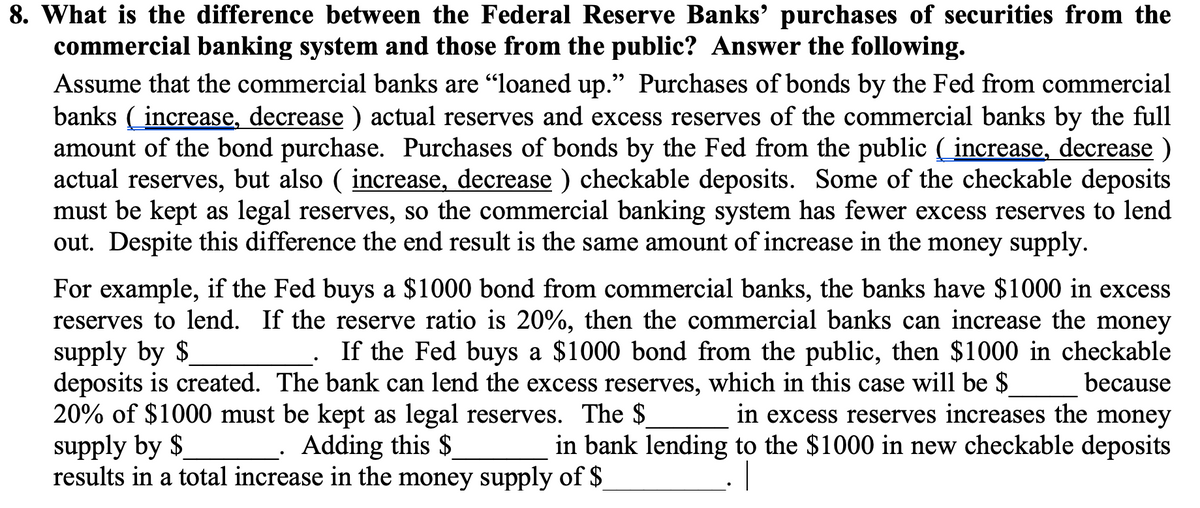What is the difference between the Federal Reserve Banks’ purchases of securities from the commercial banking system and those from the public? Answer the following. Assume that the commercial banks are "loaned up." Purchases of bonds by the Fed from commercial banks ( increase, decrease ) actual reserves and excess reserves of the commercial banks by the full amount of the bond purchase. Purchases of bonds by the Fed from the public ( increase, decrease ) actual reserves, but also ( increase, decrease ) checkable deposits. Some of the checkable deposits must be kept as legal reserves, so the commercial banking system has fewer excess reserves to lend out. Despite this difference the end result is the same amount of increase in the money supply. For example, if the Fed buys a $1000 bond from commercial banks, the banks have $1000 in excess reserves to lend. If the reserve ratio is 20%, then the commercial banks can increase the money supply by $ deposits is created. The bank can lend the excess reserves, which in this case will be $ 20% of $1000 must be kept as legal reserves. The $ supply by $ results in a total increase in the money supply of $ If the Fed buys a $1000 bond from the public, then $1000 in checkable because in excess reserves increases the money in bank lending to the $1000 in new checkable deposits Adding this $
What is the difference between the Federal Reserve Banks’ purchases of securities from the commercial banking system and those from the public? Answer the following. Assume that the commercial banks are "loaned up." Purchases of bonds by the Fed from commercial banks ( increase, decrease ) actual reserves and excess reserves of the commercial banks by the full amount of the bond purchase. Purchases of bonds by the Fed from the public ( increase, decrease ) actual reserves, but also ( increase, decrease ) checkable deposits. Some of the checkable deposits must be kept as legal reserves, so the commercial banking system has fewer excess reserves to lend out. Despite this difference the end result is the same amount of increase in the money supply. For example, if the Fed buys a $1000 bond from commercial banks, the banks have $1000 in excess reserves to lend. If the reserve ratio is 20%, then the commercial banks can increase the money supply by $ deposits is created. The bank can lend the excess reserves, which in this case will be $ 20% of $1000 must be kept as legal reserves. The $ supply by $ results in a total increase in the money supply of $ If the Fed buys a $1000 bond from the public, then $1000 in checkable because in excess reserves increases the money in bank lending to the $1000 in new checkable deposits Adding this $
Brief Principles of Macroeconomics (MindTap Course List)
8th Edition
ISBN:9781337091985
Author:N. Gregory Mankiw
Publisher:N. Gregory Mankiw
Chapter11: The Monetary System
Section: Chapter Questions
Problem 2PA
Related questions
Question

Transcribed Image Text:8. What is the difference between the Federal Reserve Banks' purchases of securities from the
commercial banking system and those from the public? Answer the following.
Assume that the commercial banks are "loaned up." Purchases of bonds by the Fed from commercial
banks ( increase, decrease ) actual reserves and excess reserves of the commercial banks by the full
amount of the bond purchase. Purchases of bonds by the Fed from the public ( increase, decrease )
actual reserves, but also ( increase, decrease ) checkable deposits. Some of the checkable deposits
must be kept as legal reserves, so the commercial banking system has fewer excess reserves to lend
out. Despite this difference the end result is the same amount of increase in the money supply.
For example, if the Fed buys a $1000 bond from commercial banks, the banks have $1000 in excess
reserves to lend. If the reserve ratio is 20%, then the commercial banks can increase the money
supply by $
deposits is created. The bank can lend the excess reserves, which in this case will be $
20% of $1000 must be kept as legal reserves. The $
supply by $
results in a total increase in the money supply of $_
If the Fed buys a $1000 bond from the public, then $1000 in checkable
because
in excess reserves increases the money
in bank lending to the $1000 in new checkable deposits
Adding this $
Expert Solution
This question has been solved!
Explore an expertly crafted, step-by-step solution for a thorough understanding of key concepts.
Step by step
Solved in 4 steps

Knowledge Booster
Learn more about
Need a deep-dive on the concept behind this application? Look no further. Learn more about this topic, economics and related others by exploring similar questions and additional content below.Recommended textbooks for you

Brief Principles of Macroeconomics (MindTap Cours…
Economics
ISBN:
9781337091985
Author:
N. Gregory Mankiw
Publisher:
Cengage Learning

Principles of Economics (MindTap Course List)
Economics
ISBN:
9781305585126
Author:
N. Gregory Mankiw
Publisher:
Cengage Learning

Principles of Macroeconomics (MindTap Course List)
Economics
ISBN:
9781305971509
Author:
N. Gregory Mankiw
Publisher:
Cengage Learning

Brief Principles of Macroeconomics (MindTap Cours…
Economics
ISBN:
9781337091985
Author:
N. Gregory Mankiw
Publisher:
Cengage Learning

Principles of Economics (MindTap Course List)
Economics
ISBN:
9781305585126
Author:
N. Gregory Mankiw
Publisher:
Cengage Learning

Principles of Macroeconomics (MindTap Course List)
Economics
ISBN:
9781305971509
Author:
N. Gregory Mankiw
Publisher:
Cengage Learning

Essentials of Economics (MindTap Course List)
Economics
ISBN:
9781337091992
Author:
N. Gregory Mankiw
Publisher:
Cengage Learning

Principles of Economics 2e
Economics
ISBN:
9781947172364
Author:
Steven A. Greenlaw; David Shapiro
Publisher:
OpenStax
